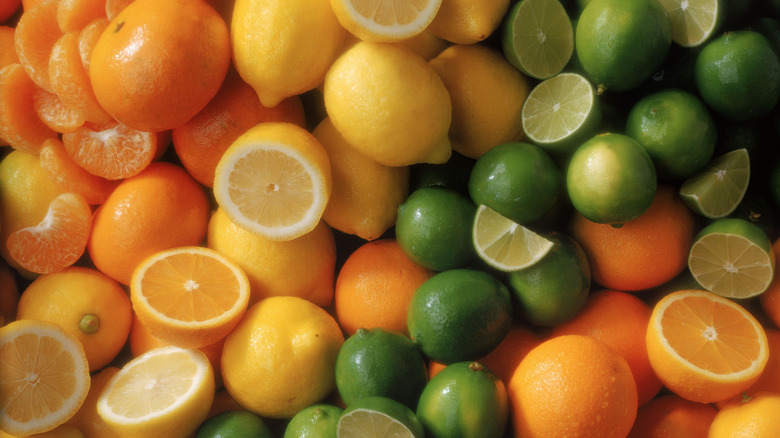Your Citrus Fruit Will Last Way Longer If You Store Them This Way
Whether you're making a tangy lemon tart, mezcal Paloma, or a lime-kissed ceviche, citrus fruits come in many shapes, sizes, and flavors and flaunt endless uses. But like any other produce, citrus fruits don't last forever. As cute as a fruit basket centerpiece is, whole room-temperature citrus fruits only last up to a week. When stored in the refrigerator, they can last up to three weeks — an upgrade from the room temperature lifespan. However, whole citrus fruits will last even longer if you store them in water.
Citrus fruits are porous, which means their water content and, subsequently, their flavor can escape the peel vita tiny holes in its flesh. When citrus fruits begin to dry out, it's significantly harder to extract their bright flavors for cooking or baking. By refrigerating them in water, the fruit's liquid content is maintained, and it can stay at peak freshness for up to three months.
Precautions and tips for storing citrus fruit in water
Storing whole citrus fruit in water is an easy, hassle-free way to keep them juicy and fresh for extended periods of time. However, food safety is far more important than the convenience of long-lasting produce, so keep a few tips in mind to ensure that you're adhering to proper food handling practices.
Before you place the citrus fruits in water, give them a good rinse. Like other fruits and veggies, dirt, insects, and bacteria can cling to the flesh of citrus fruits. If you place the fruits in water before washing them, they're bathing in dirty water. This is particularly concerning if bacteria are present on the fruit, as water and moist environments are breeding grounds for bacterial reproduction.
While many foods benefit from storage in an air-tight container, the same isn't true for citrus fruits. Without proper circulation and airflow, the fruits can get soft, bruised, and mushy — conditions that facilitate smooth entry for pathogens. Instead of sealing them up in an air-tight mason jar, place them in a bowl of water with a paper towel draped atop the opening to prevent dust and debris from entering the water. If you notice the water is dusty, dirty, or housing any debris, empty the bowl and replenish it with fresh water. The temperature of your refrigerator is important in maintaining the freshness of citrus fruits. Refrigerators should be kept under 40 degrees Fahrenheit, but 37 degrees Fahrenheit is ideal.
Recognizing signs of citrus fruit spoilage
Keeping citrus fruit in water helps extend their shelf life, but nothing lasts forever. Consuming rotten citrus fruit can lead to food poisoning caused by bacteria such as listeria and E. coli or mold. Recognizing signs of citrus fruit spoilage can prevent foodborne illness.
Relying on your senses is the easiest way to determine the status of citrus fruit. First, perform an eye test. If the fruit is shriveled, slimy, or caved into itself, it's time to compost and replace it. Similarly, visible signs of mold or any other organic growth are an automatic sign the fruit has turned.
Next, perform a smell test. When whole citrus fruits are fresh, they have a mildly tangy and refreshing smell that's mostly masked by the rind. If you notice rancid or metallic smells, get rid of your fruit — it's gone bad. If you suspect that your citrus fruit has expired, it's best to avoid performing a taste test — let your eyes and nose do the testing. Although they might not last forever, storing whole citrus fruit in refrigerated water will maximize their lifespan, and fresh-squeezed orange juice has never tasted better.


